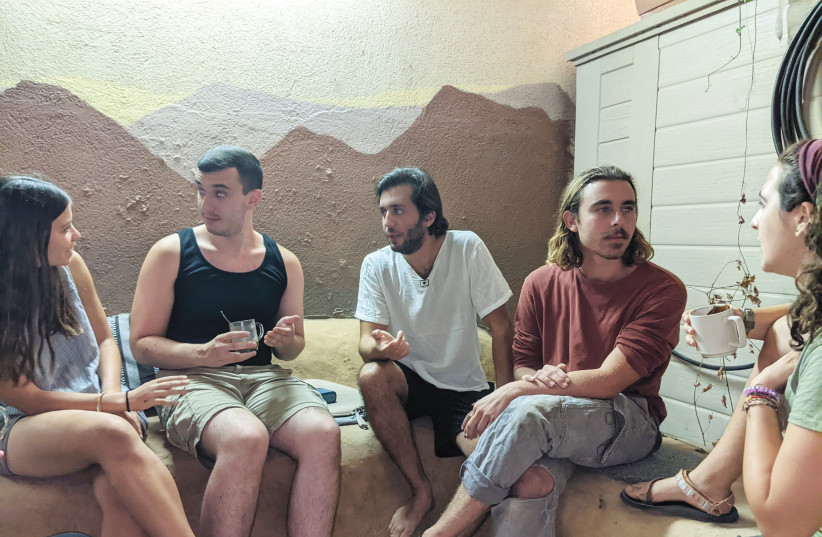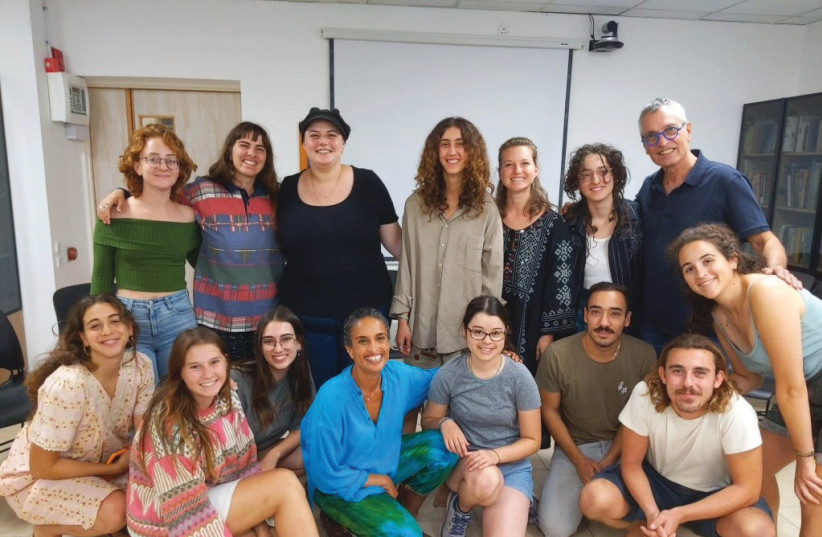What happens once war begins and you find yourself in a community of people, of different identities, who are at war with each other?
By MICHAEL M. COHENNOVEMBER 25, 2023
In conflict, clear lines are drawn with the understanding that those lines should not be crossed, particularly during war. What happens once war begins and you find yourself in a community of people, of different identities, who are at war with each other?

The challenge
Such is the reality of the students, interns, faculty, and staff of the Arava Institute for Environmental Studies. Since 1996, the institute has brought together on its Kibbutz Ketura campus Israelis, Palestinians, Jordanians, and other internationals.
The mission of the institute is “to advance cross-border environmental cooperation in the face of political conflict.” There is always a tension of holding cooperation and conflict simultaneously. During wartime, it is magnified.
An idea
On the second day of the war, I was packing up to go from the office to my kibbutz home. Since the day before, the horrific descriptions of the heinous massacre by Hamas and the beginning of the war were constant – sometimes at the forefront, sometimes beneath the surface, but always present.
That awareness hovered in my mind as I was about to collect bottles to fill with water and place them in the bomb shelters of the kibbutz. In a despondent mindset, thinking what that would mean should they have to be used, David Lehrer, the director of the institute’s Center for Applied Environmental Diplomacy, saw me and said, “I think you would want to hear this” as he invited me into the institute’s conference room.
Sitting at the table was a group of Jews and Arabs; some were students and alumni of the institute. They were there to present their idea for a joint Arab-Jewish community in the southern Arava – a bold idea in itself; but in the context of the brutality and violence and chaos taking place, it was an audacious and fearless idea. As one of the participants said, “We are trying to establish sanity in the insanity.” The idea had been percolating within their group of some 70 individuals for the past five years.

Their goal is to establish a multicultural community dedicated to building a transformative space and society. One objective is to erase minority/majority identities as a path to challenge and defy the limitations of those labels. They want to create a home where they can be their authentic selves and not, as they explained, wear the “masks” of their different societies that put pressure on them to conform. Relatedly, Robert Frost wrote, “Home is the place where, when you have to go there, they have to take you in.”
They actualized, at that moment, the spirit of the mission of the Arava Institute, “to advance cross-border environmental cooperation in the face of political conflict.” These young activists, as the horrific atrocities committed in the Gaza border area were becoming clearer, and the latest war with Hamas was commencing, were still able to continue to work toward a different horizon. I left the meeting emboldened, even as I went to fill those bottles of water confronting what they represented.
Deeper into the war
This war continues to create conditions for extreme emotions, paralleling a similar dynamic within the climate crisis of hot and cold, floods and droughts. The students and alumni of the Arava Institute, caught up in this violent storm, are no different. Some of our Israeli students were called up to serve in the IDF. Students, no matter their identity, worry for their safety, dovetailing a deep reprehension of what Hamas did in the Gaza border area, as well as a collective distress and concern for the Israeli and non-Israeli hostages and the civilians in Gaza.
Our students hold and live the full range of emotions, sometimes letting those emotions get the best of them, but always returning to a state of caring for one another. The words they exchange can be hard and they can be soft; they can be compassionate and less sympathetic; they can be accompanied by tears of grief and tears of laughter.
Woven between difficult encounters, the students organized a nonviolent communication workshop, along with other events to mitigate the pain. Classes continue, though some by Zoom for lecturers unable to come to the campus these days. Kibbutz Ketura took in some 400 evacuees – almost doubling the kibbutz population. That put a strain on the kibbutz, and the institute’s students have been helping.
Also during the second week of the war, three Arava Institute alumni created a WhatsApp group called Messages of Solidarity, a platform for Israelis and Palestinians to support each other, to share their pain, anger, frustration, as well as be reminded of the shared human experience. It has over 1,000 members. Its messages are powerful to read – honest and emotional, reaching across the abyss.
The motto of the Arava Institute is “Nature knows no borders.” Underlying those words is the profound understanding that divisions, particularly those imposed by human beings – not just on the environment but also by our national, religious, ethnic labels – can be transcended for a better world. The students and alumni of the institute understand that orientation and work hard to walk that walk even during these days of agony and strife.
Difficult conversations
One of the most important aspects of the Arava Institute experience is our Dialogue Forum – a component of the program that provides a safe and structured place for difficult conversations that can’t be avoided. Because of the war, the forum went online for a number of weeks, which was limiting. Therefore, during the third week of the war and when it would have been easier to run away from the conflict, the students decided to create, going forward, weekly sessions to better understand the history and many layers of the century-long conflict between Palestinians and Israelis. That decision echoes their choice to remain on campus with what they call their new “family,” even when they have the chance to return to their homes.
One of our Palestinian students could have gone back to Bethlehem after the war started but decided he wanted to stay here and build on the trust, understanding, and compassion he has found on the campus. He sees staying at the institute as an opportunity to live with and learn about the other; in his case, as a Palestinian, to learn about and better understand Jews and Israelis. I have heard that same sentiment from many of our students – we are the “family” they want to be with in these challenging days.
As one of our Arab students explained through a post on Instagram, “This moment is giving us the push for something new, even though it’s so painful. It pushes us forward to something different.” Another Arab student posted, “It doesn’t mean that we don’t go through challenges. But we have an implied consensus to act from a place of compassion and not from a place of anger.” An Israeli Jewish student said she is “grateful this place exists, particularly during this difficult time, as a place that offers and builds hope and inspiration; a place that gives voice to repairing that which is broken – the political and the personal.”
The pathos of the past seven weeks has included reaching out to Israeli friends on both sides of the Green Line, as well as Palestinians in the West Bank and Gaza, comforting staff members of the Arava Institute over the loss of loved ones murdered by Hamas, helping with the evacuees on Kibbutz Ketura, getting an institute alum’s Palestinian mother out of Gaza, and demonstrating in solidarity with and in support of the hostages and their families.
Kibbutz Ketura
Two weeks ago, there was to have been a three-day celebration of the 50th anniversary of the founding of Kibbutz Ketura in 1973. Because of the war, it was postponed to an undetermined date. In a similar twist of fate, the original dedication of the kibbutz was to have been held October 15 but was put off until November 22 because of the Yom Kippur War.
In fact, the dedication scroll, read by Ketura founding member Judy Bar-Lev 50 years ago, stated, “We do not yet know when we will be allowed to put our swords into plowshares, and the battle is still raging heavy. But precisely at this time, in the act of establishing our settlement, there is a sign and a symbol of our way and our faith in life and in man.” A profound reminder that an idea may be delayed, there may be obstacles in the way, but its day will come.
Across the divide
The other week, I corresponded with a Palestinian alum of the institute, from the institute’s first year, who lives south of Jerusalem and with whom I have stayed in touch and met over the years.
I shared with him that our first grandchild is due to be born next week in Israel, and how part of that joy is mitigated in that he will be born during war.
He wrote back, “It is very sad, isn’t it? You can cope with your own suffering, but when it comes to your kids and grandkids, you want the best for them…. We have a saying in Arabic, ‘The darkest time of night is before dawn.’ Hopefully, the war will end before your grandson is born.”
Two fathers embraced by their care and worries for their children and grandchildren.
Last weekend, for the first time since the war began, most of our students left campus to visit family and friends. I decided to check and see if anyone wanted to attend my weekly Torah study. The first to respond in the affirmative was a Palestinian student. We entered the first Shabbat of Kislev and its holiday of light, Hanukkah, with a group of Jews and Muslims studying together parashat Toldot.
Our world is made up of light and darkness, and as the recent partial lunar eclipse reminded us, there are times when the darkness encroaches on the light. We are living through those times. The ongoing challenge of the Arava Institute is to maintain the light, particularly during days like these, while at the same time strengthening and increasing the light going forward.
When it comes to Israelis and Palestinians working to overcome their differences and better understand each other, detractors of that process will say it is too complicated and messy and by no means perfect. That is true, but that is why that work is not a simple salve to erase vast differences; rather, that work is the burdensome and difficult encounter with what is labeled as intractable.
Vaclav Havel [Czech playwright and former president of Czechoslovakia] said it so well: “Hope, in this deep and powerful sense, is not the same as joy that things are going well, or willingness to invest in enterprises that are obviously headed for early success, but rather an ability to work for something because it is good, not just because it stands a chance to succeed…. Hope is definitely not the same thing as optimism. It is not the conviction that something will turn out well, but the certainty that something makes sense, regardless of how it turns out.”
The writer is a Reconstructionist rabbi emeritus of the Israel Congregation in Manchester Center, Vermont. He teaches at the Arava Institute for Environmental Studies at Kibbutz Ketura and at Bennington College.
